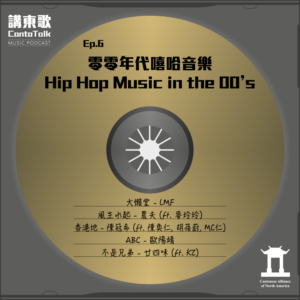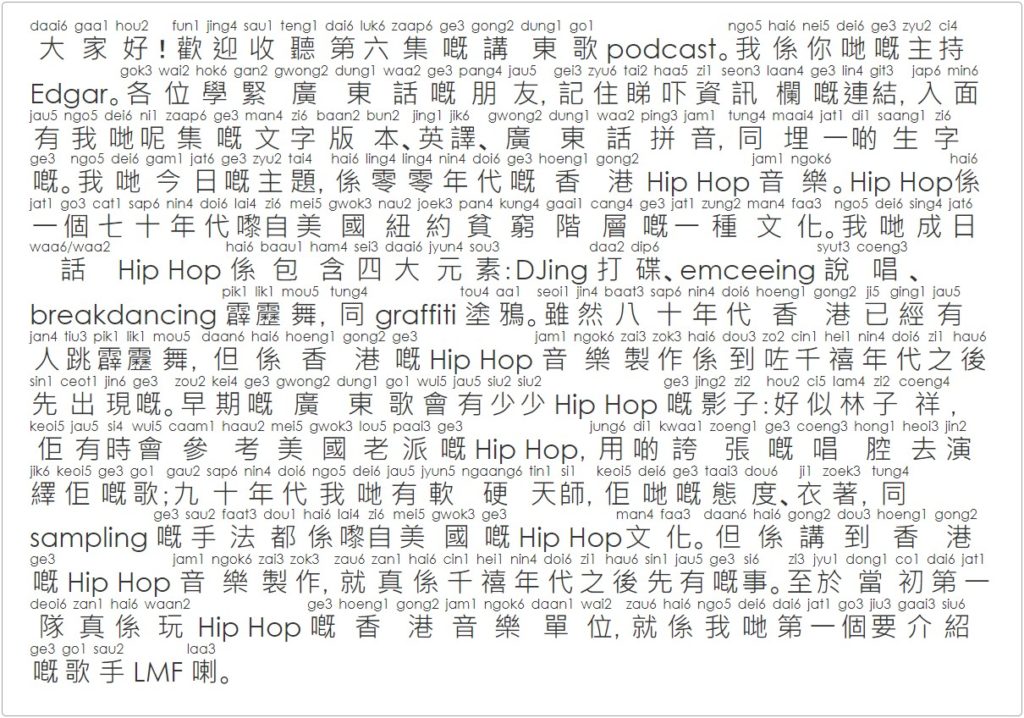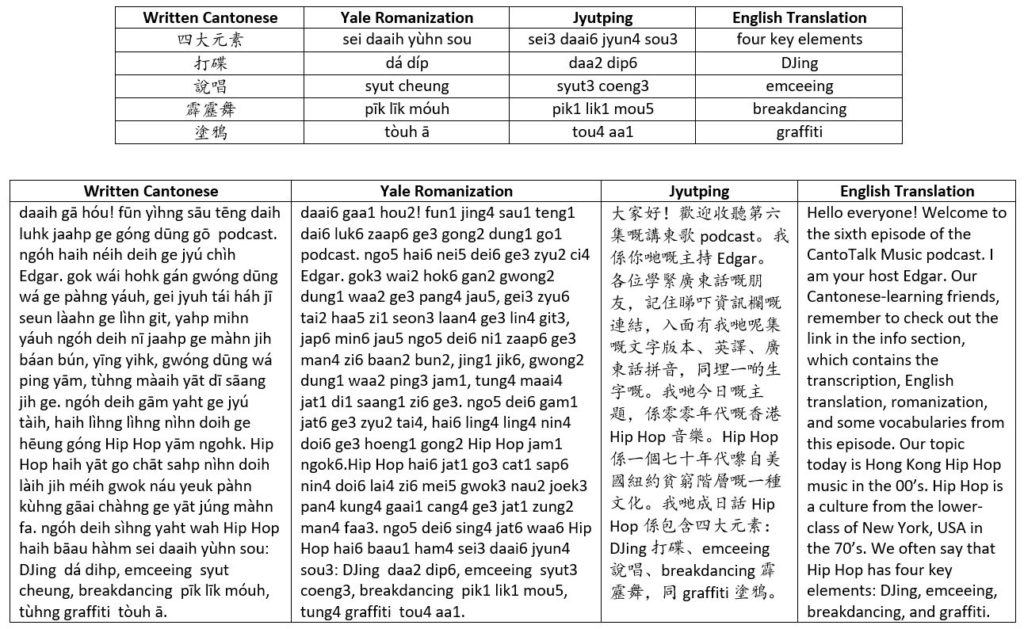CantoTalk Episode #6

 Please go to Quizlet for 29 vocabulary items. Each item comes with a recording, written Cantonese, Yale, Jyutping, & English translation.
Please go to Quizlet for 29 vocabulary items. Each item comes with a recording, written Cantonese, Yale, Jyutping, & English translation.

Hello everyone! Welcome to the sixth episode of the CantoTalk Music podcast. I am your host Edgar. Our Cantonese-learning friends, remember to check out the link in the info section, which contains the transcription, English translation, romanization, and some vocabularies from this episode. Our topic today is Hong Kong Hip Hop music in the 00’s. Hip Hop is a culture from the lower-class of New York, USA in the 70’s. We often say that Hip Hop has four key elements: DJing, emceeing, breakdancing, and graffiti. Though there was breakdancing in Hong Kong in the 80’s, the Hip Hop music production in Hong Kong only appeared after the 00’s. Early Cantopop can show subtle hints of Hip Hop. For example, George Lam sometimes performed with an exaggerated inflection in his songs with reference to old-school Hip Hop. In the 90’s, we have Softhard, whose attitude, clothing, and sampling style all come from the US Hip Hop culture. However, when it comes to Hip Hop music production in Hong Kong, it’s really only a thing after the 00’s. As for the first real Hong Kong Hip Hop music group, that’d be LMF, the first group of musicians we’ll be talking about.

LMF, Lazy Mutha Fucka in full, or 大懶堂 (lit. Big Lazy Hall) in Chinese, is a eight-man Hip Hop band. After debuting in 1999, they released a lot of Cantonese Hip Hop music full of foul language. While we may not see explicit songs as a problem nowadays, they sparked a lot of controversies back then with the conservative social climate and the Karaoke-song-and-love-song-filled music scene. The content in a lot of their songs discusses and involves different social phenomena. For example, their earlier works would criticize the Japanophile culture back then. They even released songs to condemn police brutality and the government during the social movement in 2019. Since their music wasn’t mainstream, it’s very hard for them to promote their songs on radios and TV stations. Regardless, perhaps because their songs represent the teenagers’ attitudes and the voices of Hongkongers really well back then, attacks from media and claims of being a bad influence for children did not stop their songs from spreading widely, and they even got signed by a record label. In 2000, they released a clean song called 大懶堂 (lit. Big Lazy Hall) and promoted it on the radios, successfully winning the Ultimate Music Group Gold Award and the Ultimate Top Ten Songs in that year’s Ultimate Song Chart Awards Presentation, which has never been done for non-mainstream music. Even more, members of LMF all have hidden talents outside of rapping, and are the pinnacles of their respective fields, such as graphic design, DJing, graffiti, and music production. Their direct and indirect contributions to the Hong Kong music scene both in and out of LMF cannot be summarized with just a few sentences here. Nowadays, many famous Hong Kong rappers attributed the inspirations of their music to LMF or members of LMF. Without further ado, our first song is 大懶堂 by the legendary Hong Kong Hip Hop group LMF!

Just now we had 大懶堂 by LMF! If LMF’s music is non-mainstream, then the music group that most successfully brought this non-mainstream music to the mainstream must be FAMA, which we’ll be talking about next. FAMA is a Hip Hop duo formed in 2000, having been inspired by LMF. Their members include C-Kwan and 6-Wing. In 2002, they impressed LMF’s DJ Tommy and were signed under his record label. Different from LMF’s anger and dissatisfaction with social injustice, FAMA talks about more trivial, everyday matters, such as breaking up, parent-child relationship, and even buying stocks, in a funny, relaxing way. In 2006, they started to gain attention from the audience in Hong Kong, topping a lot of their songs on charts and winning them the publicly-voted Ultimate My Favorite Music Group Award in the 2008 Ultimate My Song Chart Awards Presentation. Although their music is dissimilar to the traditional US Hip Hop ala LMF, a lot of people found their songs relatable, praising them for having meaningful lyrics full of Hong Kong characteristics. They even became the first Hip Hop group to hold concerts in the Hong Kong Coliseum. Understand that, to have held a concert in the Hong Kong Coliseum is the highest honor for a Hong Kong singer. The song we’re talking about today is 風生水起 (lit. Rising Wind and Ascending Water), which can be said as the song that made FAMA famous. In this song, they invited Feng Shui master Mak Ling Ling to rap together, writing a song about Chinese fortune telling, which is very representative of Cantonese culture. Okay! Our second song is 風生水起 by FAMA featuring Mak Ling Ling!

Just now we had 風生水起 by FAMA featuring Mak Ling Ling! Speaking of Hong Kong Hip Hop music in the 00’s, we can’t not mention Edison Chen’s album Please Steal This Album. Canadian-born Edison Chen had loved Hip Hop culture since he’s young. In his first couple of albums after his debut in 2000, he only sang Karaoke songs and love songs, making him very unhappy. In 2004, he finally got the chance to make a Hip-Hop-only album, even finding MC Yan from LMF and famous music producer Hanjin Tan for help. Still, since Edison was signed onto a big music label, besides Hip Hop, there’re also elements of Karaoke songs and love songs in Please Steal This Album, creating a very unique style. For example, 香港地 (Hong Kong in colloquial Cantonese), which we’re talking about today, is a song about paying homage to Hong Kong: no matter where you’re from, what language you speak, as long as you love Hong Kong’s culture, and agree with the values and spirits of Hongkongers, you’re a Hongkonger. Coincidentally, of the singers of this song, MC Yan’s born in Hong Kong, Edison Chen’s born in Canada, Hanjin Tan’s born in Singapore, and Paisley Hu’s born in Mainland China: everyone’s from all over the world, but they sing the same 香港地. For our third song, we have 香港地 by Edison Chen, featuring Hanjin Tan, Paisley Hu, and MC Yan.

Just now we had 香港地 featuring Hanjin Tan, Paisley Hu, and MC Yan! Ten years ago, if you had found a Hongkonger and asked him / her who’s the most famous Cantonese rapper, he / she would’ve either answered FAMA or MC Jin, whom we’re going to talk about next. Coming back to Hong Kong in 2008 to further develop his career, he’s actually already a pretty established rapper in the US. He first got famous from being a freestyle rapper in the US. Freestyle rap means rapping spontaneously, that is, creating and performing with the music on the spot without preparing lyrics beforehand. In 2002, he beat a six-week champion in a freestyle battle at Black Entertainment Television, and was also the champion for Freestyle Friday for seven consecutive weeks, even getting on the show’s hall of fame. Afterwards, besides making songs in collaboration with Kanye West, he also became the first Asian American to appear on the US Billboard album chart. He’s even made his way into Hollywood, composing and acting for Fast and Furious. After he got back to Hong Kong, he released a song called ABC, talking about how it’s like to be a Chinese American. The catchy tunes of the song immediately blew the song up in popularity, getting MC Jin the opportunity to host and act in TV dramas in TVB. I know a lot of the listeners of this podcast are Asian Americans. Would you be able to relate to this song, ABC? For our fourth song, we have ABC by MC Jin.

Just now we had ABC by MC Jin. In the West, we use the English letters OG to describe the older, most classic musicians in the field of Hip Hop. When it comes to well-recognized OG’s in Hong Kong, besides LMF, there’re also the two music units we’re going to talk about next: 24Herbs and KZ. In 2003, LMF once disbanded because they felt like their artistic freedom was being limited. Just now we mentioned that their members DJ Tommy and MC Yan still continued helping other musicians produce Hip Hop songs afterwards. As for two other members of LMF, Phat and Kit, they formed another legendary Hong Kong Hip Hop group 24Herbs in 2006, along with four other friends. In Cantonese, 廿四味 (24 flavors) is a herbal tea made out of 24 kinds of herbs. They came up with this name because the members of the group, though originally from different countries such as Australia, the US, Indonesia, Hong Kong, and Canada, can create something representative of the Hong Kong local culture when mixed together. And just like 24 flavors, their songs also combined many different styles of Hip Hop, mixing them into Hong Kong music. As for KZ, he’s originally from the Hong Kong underground Hip Hop group SANGFAN. Having switched to rapping because of LMF, he released the classic Hong Kong Hip Hop album Kneer Poemz. Our listeners from Hong Kong may be familiar with some of his music video parodies on YouTube from before. For example, the meme video “佢家吓黃色衫, 又變返著綠色衫” (lit. He’s now in a yellow shirt, and he switched to wearing a green shirt again) from back then is actually created by him. KZ is famous for his superb wordplays and rhymes: I believe everyone would be able to feel his talents upon listening to the next song we’re going to talk about: 不是兄弟 (lit. Not Brothers). 不是兄弟 is a collaborative work between 24Herbs and KZ. Back then, the song rose to fame after having been featured in Sleeping Dogs, a triple A video game based in Hong Kong. Similar to the game, the song also talks about the triad’s brotherhood and gang culture. Okay! Our last song is 不是兄弟 by 24Herbs featuring KZ!

Just now we had 不是兄弟 by 24Herbs featuring KZ! Actually, a lot of the singers that we’ve talked about today have not been releasing songs in Hong Kong for quite a while, with some even focusing their career in Mainland China instead. That said, they were the first group of people that brought Hip Hop music to Hong Kong back then. And a lot of their work is very influential on Hong Kong rappers that rose up in the 2010’s and recent years. So who’re these Hong Kong rappers that rose up in the 2010’s and recent years? We’ll save it for next time. I am Edgar. Thank you for listening to the CantoTalk Music podcast. I’ll see you in the next episode!
To the right is a screenshot preview of a comprehensive handout that includes a full transcript, vocabulary, comprehension questions, and a featured song. The handout will be available for purchase, with the added benefit that CantoLTA members can enjoy up to 2 complimentary handouts and can purchase additional ones at an exclusive 20%


Thank you for tuning in!
Please give credit to Edgar Chung and the Cantonese Alliance of North America!